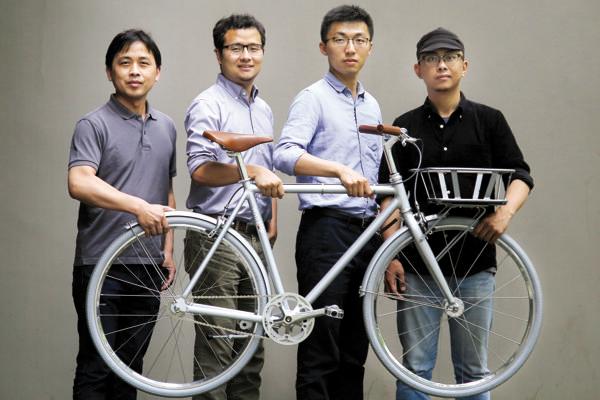Gao Shusan ditched his Peugeot 3008 in April and began cycling to office, putting him among a growing contingent of health-conscious young urbanites who are changing their lifestyles to be more environmentally friendly.
Now the 31-year-old battles narrow bicycle lanes each day, much like his father and the millions of other Chinese who in recent decades helped China become known as “the bicycle kingdom” before it emerged as the world’s biggest auto market in 2009.
Bikes were so closely associated with the image of the country, in fact, that when George H.W. Bush visited Beijing in 1986 in his role as the head of the US Liaison Office, he was given two of them from the central government - one for him, another for his wife.
Then as now, China is ranked as the world’s No 1 producer and user of bikes, but the latter number has been plunging in recent years.
Similarly, bike lanes in cities like Shanghai have been disappearing, redesigned and recycled for cars, and are now populated mostly by deliverymen and senior citizens.
There were 370 million bicycles in use in China by the end of 2013, down 26 percent from 500 million in the early 1990s, according to estimates by the China Cycling Association. While output remains steady - 1,500-plus factories produce about 80 million bikes a year - 60 percent of these are now exported.
In contrast, the number of licensed drivers jumped from 100 million in 2010 to 300 million last year, data from the national statistics bureau show. Less than half own a car, however, as there are about 150 million passenger cars in China.
Gao is more than just an enthusiast, though. He wants to design a new model that will inspire his generation to get back on two wheels and enjoy the benefits of this change in lifestyle.
The postgraduate student at Shanghai Tongji University, who is majoring in architecture and urban planning, said he can draw on his academic experience to further this pursuit.
“The way we design buildings turns out to be quite different from what we were taught at school. It is usually done in a very commercial, traditional and environmentally unfriendly way,” said Gao, who previously worked for a German architecture firm in Shanghai for five years.
Last year, he quit his job and made an initial investment of 200,000 yuan ($32,250) with three friends to start a bike workshop. Now his team of four full-time and two part-time staff are focused on creating the perfect bike for commuting in busy cities.
Their first models for men and women were introduced in March in a choice of two colors: black and grey. The Bauhaus-inspired bikes are mainly made of aluminum alloy while the frame design comprises straight lines at angles of 73 degrees.
They retail for 2,399 yuan ($387) including delivery, or about 1/40 the cost of a registration plate in Shanghai, which are sold via auction.
“Sales have been better than we expected, especially considering that we have just started and how bikes are becoming increasingly marginalized in Chinese cities,” said Gao.
Scores of units have been sold so far from their one and only store on Taobao.com, China’s largest online shopping bazaar. The team could yet afford to run a brick-and-mortar store. Most of his customers already have a car, he said.
“Bicycles offer an alternative. They speak for a responsible, energetic and peaceful lifestyle, but are no longer essential in daily life,” he added.
When Gao was a child in the 1980s, bicycles, together with sewing machines, watches and radios were considered the four most valuable goods a household could own. They were status symbols indicating a well-to-do household. The cost of a bicycle, around 150 yuan, was equivalent to up to two months’ income for many families.
The average price of the 30 million bikes bought each year in China stands at around 300 yuan, according to industry insiders. The median annual income of a household in Shanghai was 47,710 yuan in 2014, up 30-fold from 1985.
All of which makes them highly affordable but also fairly low in quality. Some are in such bad shape that utility cyclists treat them as disposable goods to be chucked away and replaced each year.
Together with his team, which includes two architects, one diehard fan of fixed-gear bikes and a veteran technician from one of the country’s largest bike factories, Gao wants to help change the shabby image that bicycles in China have picked up.
Their bikes have closer and fitter mudguards, so that the user’s pants won’t get dirty on rainy days. Moreover, the seat height is lower than that of a mountain bike while the sitting posture is semi-upright. Gao said this was done intentionally to help tired commuters wake up in the morning.
The revitalized interest in bikes, largely resulting from the worsening traffic conditions in mega-cities like Shanghai and people’s growing desire to keep fit, has given rise to many similar businesses.
In Shanghai alone, bicycle stores are sprouting up with offerings ranging from vintage models to cutting-edge high-tech machines.
Italian brand ABICI recently set up a 6-meter-high all-white showroom in the city’s downtown to promote its bikes and how the models are handmade in Italy and then exported to China.
London’s Brompton Junction, which makes folding bikes, warns its Shanghai customers that its models might become “an obsession”, as well as “a solution to urban living problems”. When folded, they are about the size of a suitcase.
ABICI charges 6,000 yuan for its bicycles. The starting price of a Brompton Junction model is double this.
“For me, bikes were an integral part of my teenage years,” said Gao, adding that it can be significantly quicker to get around a gridlocked city on two wheels these days than traveling by car or bus.

